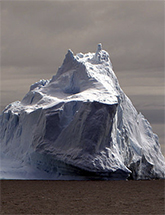World War I and the unconscious
 I was in Barnes & Noble earlier today and, intrigued by the cover of the latest Time magazine (which oddly featured a full-page photograph of Abraham Lincoln), I realized that the 150th anniversary of the beginning of the Civil War is coming up in three days (April 12, 2011). Such numerically-significant anniversaries are rare occasions for the national discourse to turn and (briefly) examine the significance of history to contemporary life. I always seem to miss these kinds of precious discussions. Currently, I’m working through Paul Fussell’s The Great War and Modern Memory and am still on the early-20th-century wavelength (oh! where was the 150th anniversary of the firing on Ft. Sumter when I was reading Paul Menand’s The Metaphysical Club and was on my Civil War “kick”?).
I was in Barnes & Noble earlier today and, intrigued by the cover of the latest Time magazine (which oddly featured a full-page photograph of Abraham Lincoln), I realized that the 150th anniversary of the beginning of the Civil War is coming up in three days (April 12, 2011). Such numerically-significant anniversaries are rare occasions for the national discourse to turn and (briefly) examine the significance of history to contemporary life. I always seem to miss these kinds of precious discussions. Currently, I’m working through Paul Fussell’s The Great War and Modern Memory and am still on the early-20th-century wavelength (oh! where was the 150th anniversary of the firing on Ft. Sumter when I was reading Paul Menand’s The Metaphysical Club and was on my Civil War “kick”?).
Fussell’s book, though, is yielding too much nutritious food for thought to put aside. In the chapter titled “Adversary Proceedings”, Fussell quotes 20th-century psychologist Carl Jung for whom the First World War was such a such a strong influence that it crept into his dreams after (and, if we are to believe his enigmatic Red Book, even before) the war:
[Jung] dreamed that he was ‘driving back from the front line with a little man, a peasant, in his horse-drawn wagon. All around us were shells exploding, and I knew that we had to push on as quickly as possible, for it was very dangerous [. . .] The shells falling from the sky were, interpreted psychologically, missiles coming from the “other side.” They were, therefore, effects emanating from the unconscious, from the shadow side of the mind [. . .] The happenings in the dream suggested that the war, which in the outer world had taken place some years before, was not yet over, but was continuing to be fought within the psyche.’
Reading this quote by Jung made me think of something that has fascinated me about psychology for some years. Specifically, it’s been a mystery to me how widely the ideas of Sigmund Freud, the founder of psychoanalysis and an iconic figure, were taken up by the Western world and how deeply ingrained some of them have become even though many of his theories were not very scientific. (more…)
The death of “high” diction
 Like anyone who reads a lot of books written before one’s grandparents were born, the imaginary world of literature and history begins in the mind to contend with the perception of the immediate world of real life. Outmoded words begin to enter the vocabulary, and must be consciously prevented from escaping into the daylight of ordinary conversation. One instinctively knows that words like “valor”, “comradeship”, and “foe” have no place in everyday language (“How was your basketball game today?” “Oh, it was a great! My comrades and I vanquished the foe 3-1.”) though words such as these crop up in older writings all of the time. Like chivalry, these “high” forms of speaking are now dead. But what killed them?
Like anyone who reads a lot of books written before one’s grandparents were born, the imaginary world of literature and history begins in the mind to contend with the perception of the immediate world of real life. Outmoded words begin to enter the vocabulary, and must be consciously prevented from escaping into the daylight of ordinary conversation. One instinctively knows that words like “valor”, “comradeship”, and “foe” have no place in everyday language (“How was your basketball game today?” “Oh, it was a great! My comrades and I vanquished the foe 3-1.”) though words such as these crop up in older writings all of the time. Like chivalry, these “high” forms of speaking are now dead. But what killed them?
This week, I started reading The Great War and Modern Memory (1975) by Paul Fussell, which describes the traumatizing shock that the First World War delivered to the Western psyche. To die with the millions of soldiers in combat was a European idea about the perfectibility of mankind and society. The effect of this collective experience lasts to this day, even in America.
The summer before the war, the summer of 1914, was memorable for its picnic-perfect weather. During these warm summer months, Europe (especially Britain, which hadn’t really seen war for a hundred years) breathed the air of chivalry, romanticism, and boundless self-confidence for the last time. The shock of the war to come contrasted so sharply with the idyllic season before it (Fussell describes at length in the first chapter how this dichotomy created a sharp and enduring impression of the irony of life on the Western psyche), that “the summer of 1914” would for many decades become synonymous with astonishing naiveness.
To illustrate how this change took place, Fussell relates a handful of the countless ironic (meaning, having one’s optimistic hopes about the future punished with exaggerated misery instead) experiences that soldiers witnessed during the war. Fussell quotes one instance from another author’s memoir: (more…)
leave a comment